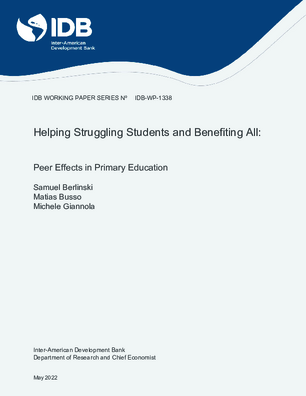Helping Struggling Students and Benefiting All: Peer Effects in Primary Education
Date
May 2022
Summary
We exploit the randomized evaluation of a remedying education intervention that improved the reading skills of low-performing third grade students in Colombia, to study whether providing educational support to low-achieving students affects the academic performance of their higher-achieving classmates. We find that the test scores of non-treated children in treatment schools increased by 0.108 of a standard deviation compared to similar children in control schools. We interpret the reduced-form effect on higher-achieving students as a spillover effect within treated schools. We then estimate a linear-in-means model of peer effects, finding that a one-standard-deviation increase in peers' contemporaneous achievement increases individual test scores by 0.679 of a standard deviation. We rule out alternative explanations coming from a reduction in class size. We explore several mechanisms, including teachers' effort, students' misbehavior, and peer-to-peer interactions. Our findings show that policies aimed at improving the bottom of the achievement distribution have the potential to generate social-multiplier effects that benefit all.




